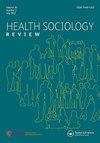卫生保健工作者调动文化卫生资本,帮助社会边缘化患者
IF 2.5
2区 医学
Q2 HEALTH POLICY & SERVICES
引用次数: 10
摘要
医疗保健文化资本动员研究主要集中在低社会经济地位或少数民族患者如何在医疗保健领域挣扎。本研究考察了提供者、护理协调员和管理人员如何利用自己的文化资本资源来加强卫生服务的公平性,并探讨了这种努力的局限性。本文通过对美国社区卫生中心的西班牙裔和非西班牙裔白人人员进行35小时的访谈,探讨医疗保健“供应方”的个人如何表现出对患者文化资本的灵活期望。参与者承认移民身份和家庭角色等因素如何影响患者在临床互动中展示传统高价值文化资本的能力。然而,仅凭提供者灵活的期望和文化知识,无法为有色人种的贫困患者提供全面的护理。持续存在的系统障碍,如高成本和有限的公共项目,要求医护人员在与患者互动之外进行护理。与会者描述了从专业社会网络中获得支持以协调面临多种形式社会边缘化的患者的访问的危险过程。在承认跨文化技能的重要性的同时,本研究解释了阻碍专业文化培训干预在大范围内纠正卫生服务不平等的能力的过程。本文章由计算机程序翻译,如有差异,请以英文原文为准。
Healthcare workers mobilising cultural health capital to assist socially marginalised patients
ABSTRACT Research on cultural capital mobilised in healthcare largely focuses on how patients of low-socioeconomic status or ethnic minority groups struggle in the healthcare field. This study examines how providers, care coordinators, and administrators use their own cultural capital resources to bolster equity in health services, and explores the limitations of such efforts. Thirty-five hours of interviews with Hispanic and non-Hispanic White personnel at U.S. community health centres are used to explore how individuals on the ‘supply-side’ of healthcare may exhibit flexible expectations of patient cultural capital. Participants acknowledge how factors such as immigration status and family roles affect patient ability to exhibit traditionally high-value cultural capital in clinical interactions. Yet, providers’ flexible expectations and cultural knowledge alone cannot deliver comprehensive care to indigent patients of colour. Persistent systemic barriers like high costs and limited public programs require healthcare workers to navigate care outside of interactions with patients. Participants describe the precarious process of drawing favours from professional social networks to coordinate access for patients facing multiple forms of social marginalisation. While acknowledging the importance of cross-cultural skills, this research explains processes impeding professional cultural training interventions in their ability to correct health service inequities on a broad scale.
求助全文
通过发布文献求助,成功后即可免费获取论文全文。
去求助
来源期刊

Health Sociology Review
Multiple-
CiteScore
7.50
自引率
0.00%
发文量
14
期刊介绍:
An international, scholarly peer-reviewed journal, Health Sociology Review explores the contribution of sociology and sociological research methods to understanding health and illness; to health policy, promotion and practice; and to equity, social justice, social policy and social work. Health Sociology Review is published in association with The Australian Sociological Association (TASA) under the editorship of Eileen Willis. Health Sociology Review publishes original theoretical and research articles, literature reviews, special issues, symposia, commentaries and book reviews.
 求助内容:
求助内容: 应助结果提醒方式:
应助结果提醒方式:


